Now-dispersed Iraqi Jewish community fights for access to its legacy
With a stolen trove of historical documents slated for return to Baghdad, Jews from Iraq demand their personal effects back — with many of their Muslim former neighbors’ support
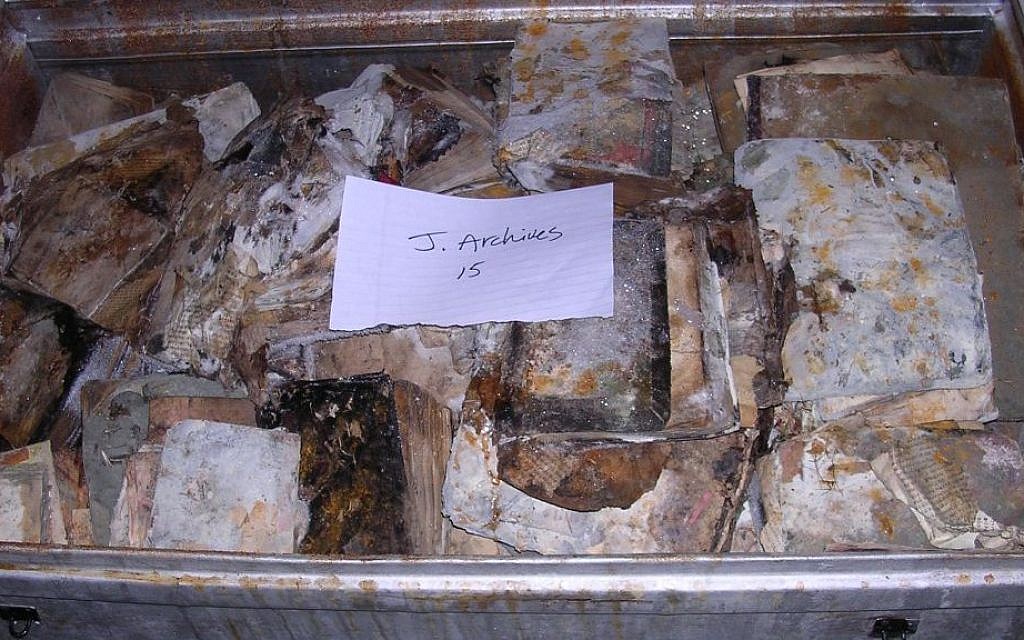
Centuries-old books and documents from the Iraqi Jewish archive await preservation. (photo credit: Courtesy The National Archives)
In 2003, a group of 16 American soldiers from the Mobile Exploitation Team Alpha discovered a trove of Iraqi Jewish documents in Saddam Hussein’s basement. It was quickly realized by the soldiers that the archive was precious and required further attention.
The United States’ National Archives Preservation Programs painstakingly restored many of the items. Some prized Jewish documents, however, were so terribly warped after being subjected to fetid water and humidity that they were ritually buried, in accordance with the religion’s tradition.
In September 2017, the United States announced that the collection would return to Iraq, as the US State Department would not be further extending an agreement to keep the historical items in the US. Some of these relics date as far back as five centuries.
In less than a year, unless the current US administration intervenes, the documents will make their way back to Baghdad, a country boasting a Jewish population that numbers seven or less, as of official counts in 2012. Many of the country’s Muslims, as well as much of its former Jewish community, are protesting that decision.
“You have to understand that this is more of a trove than an organized archive,” said Dr. Ronen Zeidel, a University of Haifa professor who specializes in the modern history of Iraq, in an interview with The Times of Israel. “It contains personal documents of individuals.”
Zeidel suggested that the documents ought to be returned to those from whom they were seized or to their descendants.
“Why should somebody’s diploma with grades be exhibited in a museum? It would have been best if the documents and personal artifacts would have been given back to individuals,” he argued.
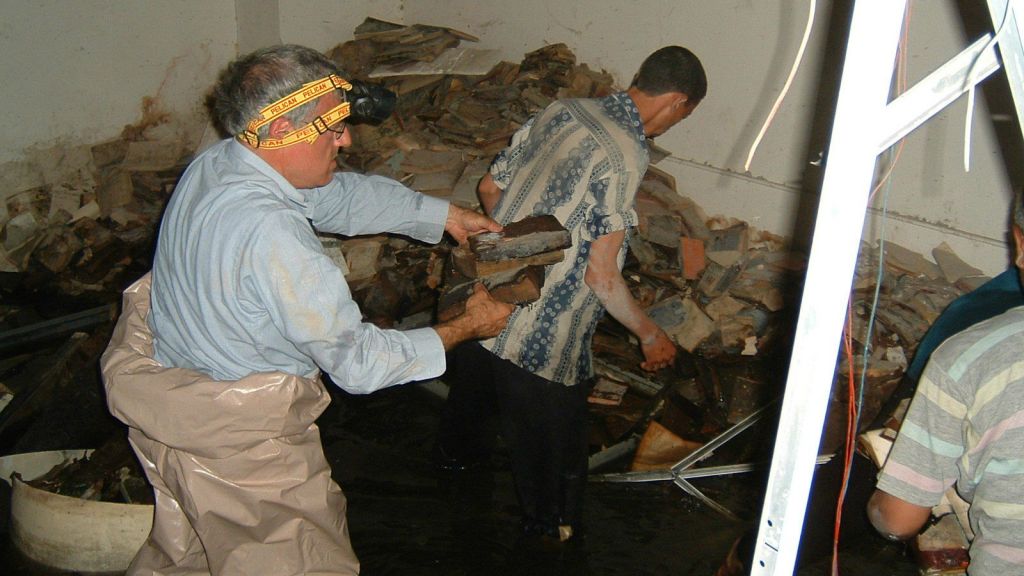
Volunteers attempt to recover Iraqi Jewish archival material from the flooded basement of the Mukhabarat, Saddam Hussein’s intelligence headquarters, 2003. (Photo by Harold Rhode, Courtesy of the US National Archives)
Most of those individuals whose documents will soon be lost to them in Iraq had found their way to Israel when, around 1950, Iraq’s Jews experienced a de-facto expulsion in a wave of Arab nationalist fervor following Israeli independence. The last airlift of Iraqi Jews was in 2006. Emad Levy, Baghdad’s last rabbi, was last to leave and described life there as “living in a prison.”
After streaming into the Holy Land, where they strove to assimilate to their new homeland, the Iraqi newcomers gripped onto their cultural underpinnings. The community’s music, food, and culture — influenced by an ancient ancestry — remain a touchstone as these Jews proudly call themselves “Iraqi.”
In today’s Iraq, however, Muslim Iraqis often only hear about their country’s Jewish traditions from parents or grandparents. Lately, Jews are also employed in the occasional modern Iraqi novel.

Miss Israel Adar Gandelsman (left) and Miss Iraq Sarah Idan pose for a picture at the Miss Universe pageant. (Instagram)
Recently, through online forums, some Jews of Iraqi origin as well as the country’s Muslims communicate with one another, often sharing recipes, stories, and photographs.
“After 2003, Iraqi literature, particularly the novel, rediscovered the now extinct Jewish community in Iraq,” Zeidel wrote in a recent Journal of Modern Jewish Studies article. The piece frames the issue of Iraqi identity and the evaporating concept of pluralism through literature.
For some Iraqi Muslims, the idea of returning their Jewish former countrymen’s archives to the country that drove them away is a frustrating proposition.
“Our memories were flooded with water in the cellars of Saddam’s Mukhabarat. The ink from the pages of our memories flower into the stagnant water, just like the blood of so many of our relatives and acquaintances,” Dr. Kheder Salim al-Basson, a vocal advocate against sending the trove back to Iraq, told The Times of Israel.
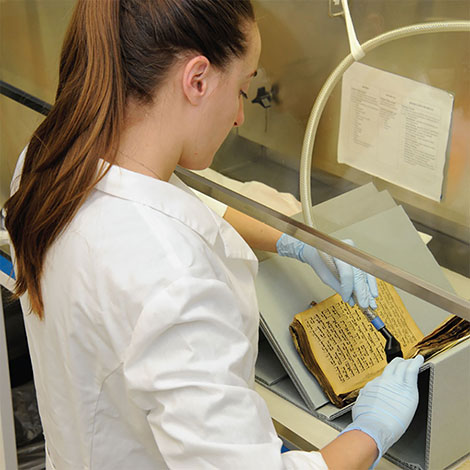
An expert in the US restoring one of the books rescued from the Iraqi Jewish community in Baghdad. (Courtesy: US National Archives and Records Administration)
“I am in a rage,” al-Basson had said in 2014, reacting to the news the archive would be taken out of the United States. “My friends in New York, Los Angeles, Toronto, Montreal, London, Amsterdam, Tel Aviv, Ramat Gan, Or Yehuda and Petah Tikva are all enraged at the possibility that the so-called Iraqi Jewish Archive will be taken back to Iraq.” (Basson confirmed that his position hasn’t changed in the past three years.)
Many Iraqi Muslims agree with Basson’s assertion and vociferously decry the poor treatment of the former Jewish minority.
“I’m against this decision taken by United States,” said Ahmed Issam (names have been altered to protect sources), an Iraqi-Muslim engineer, calling for the trove to be kept in the US. “I don’t want the artifacts to go back to Iraq at this time. It’s important to keep this heritage in the United States because the Americans can take care of this heritage better than anyone else.”
Issam pointed to previous examples of items being kept in the West, including the Ishtar Gate and the Obelisk of Hammurabi. However, he explained that he didn’t want to send the items to Israel because of the “political crisis in the Middle East.”
Fleeing from a pogrom
Jews from Iraq came from families of learning, distinction, and pride. In many ways, they were the Mizrahi intelligentsia of a new wave of immigrants to Israel. With them, they brought both rich tradition and deep pain. Much of that transported tragedy stemmed from the 1941 Farhud, a pogrom masterminded by Haj Amin al-Husseini.
Al-Husseini, the Grand Mufti of Jerusalem and one of the initial members of the Muslim Brotherhood, became a Nazi agent after meeting Adolf Eichmann, an architect of the Holocaust, in 1937. With Nazi funds al-Husseini organized the Arab Revolt of 1936-1939 which led to the British stopping Jewish immigration to modern day Israel, effectively cutting off their avenue of refuge.
In 1941, the mufti orchestrated a short-lived, Nazi-backed generals’ coup in Iraq. The aforementioned Farhud, a pogrom against Baghdad’s Jews, followed.
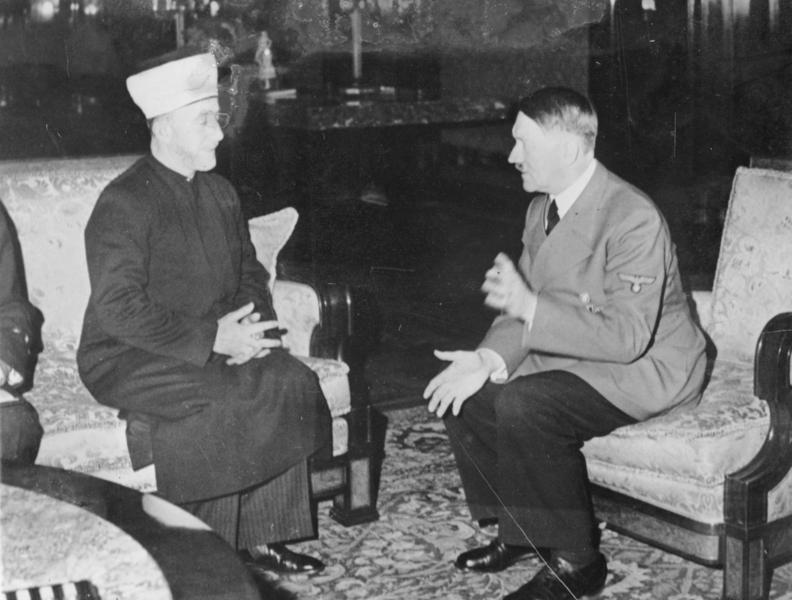
Hitler hosts Grand Mufti Haj Amin al-Husseini in 1941 in Germany. (Heinrich Hoffmann Collection/Wikipedia)
In a two-day period mobs went on a rampage in Baghdad and other cities in Iraq. At least 150 Jews were killed and more than 2,000 injured; some 900 Jewish homes were destroyed and looted; and hundreds of Jewish-owned shops were robbed and destroyed.
Much has been written about the subject, including about this author’s family and their escape from Iraq. Perhaps too little has been said about the peaceful neighbors — kind Muslim Arabs, Christians, and Kurds, that lived next door to Jews and helped them. Many helped save Jews from vicious mobs stirred by the frenzy of a wave of Arab nationalism that was partly a reaction to British control and partly a desire for greater Arab world glory that scapegoated the Jewish minority.
What Iraqis themselves have to say about Jews, often in secret for fear of retribution, paints an interesting narrative about a culture of sharing and friendship.
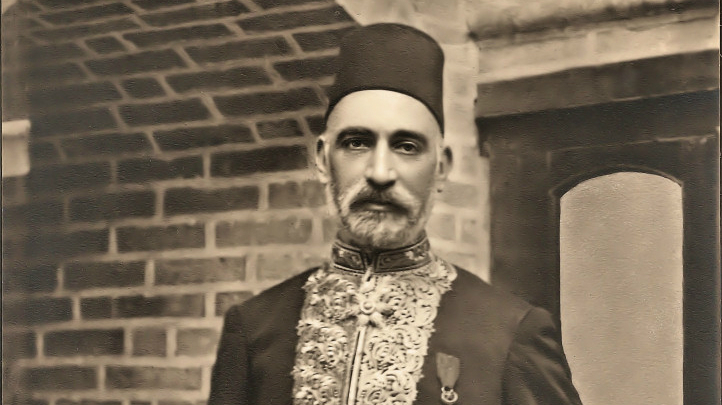
Sir Sassoon Eskell, a Baghdadi Jew who served as Iraq’s first finance minister and was a key player in the founding of the early kingdom. (Courtesy: wikipedia)
“The Jews participated in the establishment of Iraq in the 20th century through their contribution to the reconstruction of urbanization, politics, economy, arts and culture,” said Salam Raheem, a journalist. “The Jews are Iraqis before they are Jews.”
Raheem, unlike Issam, believes Jewish Iraqis should determine where the trove goes.
“Iraqi Jews have the right to keep the artifacts, and Iraq does not. There are no Jews left in Iraq, so there is no convincing reason to ask for the items back,” he said.
A rich Iraqi Jewish Diaspora
The Muslim Iraqis interviewed for the piece were often in communication with Jewish Iraqis across the globe.
“I have many friends [who are] Iraqis Jews living in Israel, Europe, the United States and Canada,” said Adel Abdulzahra, an Iraqi journalist. “It’s painful to speak to them [from abroad] because they are indigenous people who came to Iraq even before many of Arab tribes arrived after Islam was introduced here. They have been here since Babylon.
“The Jews are authentic Iraqis,” he said, calling for citizenship rights for Jews of Iraqi origin.
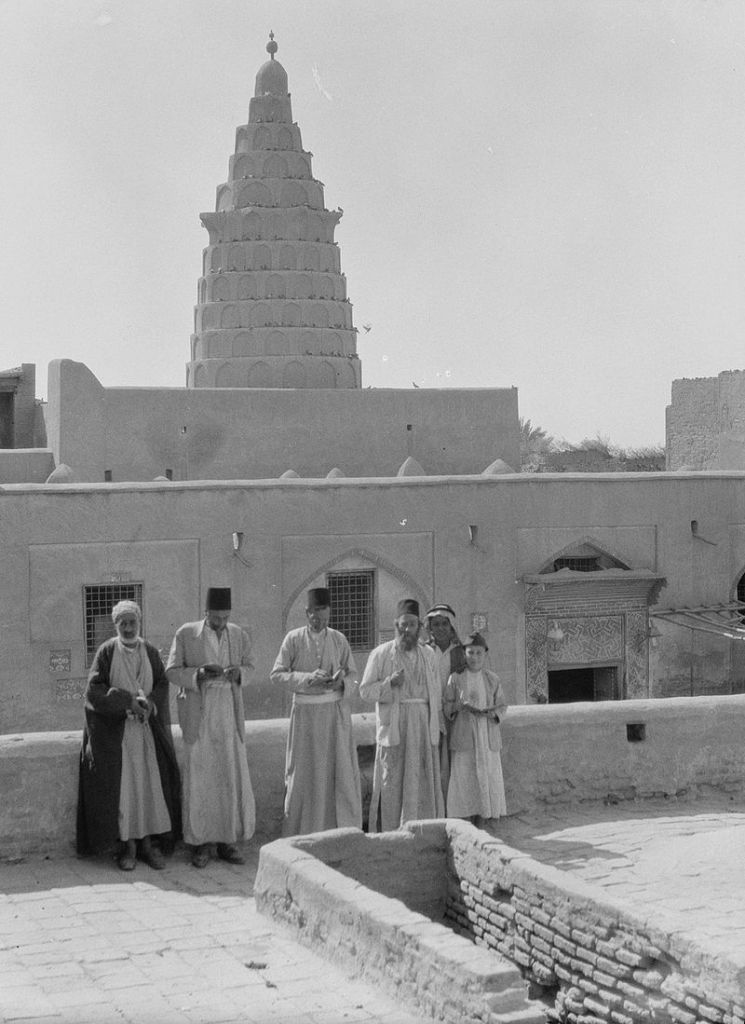
A 1932 photograph of Ezekiel’s Tomb at Kifel, in southeastern Iraq. The area was inhabited by Iraqi Jews, some of whom appear in the photo. (American Colony, Jerusalem, Photo Dept. / Eric and Edith Matson Photograph Collection / Wikipedia)
“I ask the Jews to come back,” said an Iraqi-Muslim filmmaker, Hussein Ali. “I have done many reports on Iraqi Jews and their history. I hope they will [once again] take care of their religious shrines, properties and heritage in Iraq.”
Iraqis based in Baghdad within the Ministry of Culture want to make the collection accessible, though Israeli Jews of Iraqi origin are very limited in the ability to travel to Baghdad due to travel restrictions and safety considerations.
Interestingly, the only party not involved in talks regarding where the Iraqi trove would wind up were the Israelis.
“For some reason, Israel never asked for the trove and most of the [Iraqi Jewish] community lives there,” said Zeidel.
Multiple official government sources contacted by The Times of Israel didn’t dispute the claim, but speculated that sensitivities played a role in how the Israelis deferred to the Americans on the issue.
“My understanding from the past is that they wanted the US to lead on this because of the sensitivity,” said one lawmaker who was familiar with the details of the issue.
Lawmakers and officials contacted for this story could not comment on whether there was any behind-the-scenes pressure from the Israelis on the issue.
November 30 marked the third anniversary of an official day designated to remember close to a million Jews who left the Middle East for Israel, Europe and the United States, due to a systemic oppression that permeated the Mideast.
And, as one Israeli government insider said, now more than ever this issue needs to be front and center with every American lawmaker.
[ original here ]
Tags: archives, Baghdadi, iraq, israel
Category: Baghdad, Heritage, Iraq, Israel, Preservation Promotion Education



